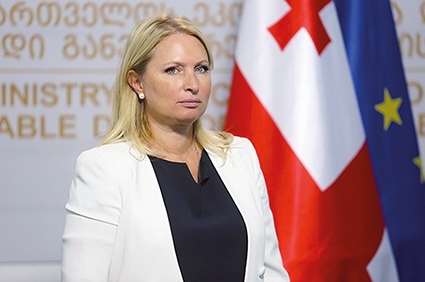Natia Turunava: We Can Use Forest Waste Processing Technology in Georgia
Deputy Minister of Economy and Sustainable Development Natia Turnava spoke to reporters late last week about the potential of using biomass as an energy source in Georgia. “In Lithuania, biomass is recycled highly efficiently to produce heat energy. We can use this alternative technology of biomass processing in different villages where, for various reasons, it is difficult to introduce natural gas,” said Turnava after participating in the closing conference of the EU Public Service Twinning project ‘Strengthening Sustainable Forest Management in Georgia.’
The project, at a cost of 840,000 EUR ($952,969), was financed by the EU Social Services Program. It included more than 120 visits to Georgia by international experts, six study visits of Georgian government officials to Lithuania and Hungary, and dozens of seminars and round-table discussions. Within the framework of the project, recommendations were developed to assist Georgian authorities to accelerate the process of reconciling practices related to the forestry sector with EU standards. The recommendations touched on several areas of the forestry sector, including legislative frameworks, institutional capacities, organizational best practices and forest management models, and reliable forest data collection and monitoring systems, focusing on intersectoral communication.
Biomass briquettes are pressed bio fuel made from dehydrated wood chips and agricultural waste. After collection of bio mass, the goods are shredded and later pressed under high pressure without any glue or other artificial additives. Biomass briquettes are a popular alternative to wood due to the long-lasting blaze, more affordable compared to legally purchased wood, and have a low negative impact on the environment
Illegal logging, largely for firewood, “is a big challenge, because the forest is one of our most unique resources. Maintaining green cover and our forests is a big priority, and it should be connected to our energy policy. We are now actively working on special research in forest cover areas on how to make and apply policies in recreation areas so as not to damage the green cover and offer the population a very affordable alternative so that they do not need to cut down trees for heating purposes,” said Turnava.
At the closing conference for the ‘Strengthening Sustainable Forest Management in Georgia’ project, presentations were given by several top officials from Georgia and the EU, including Georgian Minister of Agriculture and Environmental Protection, Levan Davitashvili, Minister of Environment of the Republic of Lithuania, Kestutis Navickas, Head of Cooperation for the EU Delegation to Georgia, Vincent Rey, and representatives of diplomatic missions in Georgia.
Biomass has been on the minds of Georgian energy experts for several years, but has only recently gained popularity in government circles. In July of this year, the Ministry of Economy and Sustainable Development held a joint workshop with the Lithuanian Biomass Energy Association (LITBIOMA) and LTD New Technology Center on the ‘Effective Use of Renewable Energy Resources in Mountainous Regions of Georgia’ to present a joint initiative of LITBIOMA, the Biomass Association of Georgia, and the Ministry of Economy and Sustainable Development to address the possibilities for biomass heating systems in Georgia.
The EU has supported green energy projects in Moldova Since 2015. 75 towns and villages have been supported in switching to green energy, including 19 new biomass-heating systems installed in the first half of 2018. Moldova’s Energy and Biomass Project is part of the EU4Energy Initiative which also operates in Georgia.
An EU-supported Covenant of Mayors Demonstration project is being implemented in Kakheti to renovate two kindergartens, in Telavi and in the village of Ikalto. The renovation is aimed at reducing energy consumption and switching to renewable energies like biomass heating systems, which will also reduce costs.
By Samantha Guthrie
Image source: Ministry of Economy











